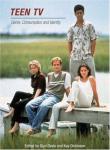AustLit
The material on this page is available to AustLit subscribers. If you are a subscriber or are from a subscribing organisation, please log in to gain full access. To explore options for subscribing to this unique teaching, research, and publishing resource for Australian culture and storytelling, please contact us or find out more.
Latest Issues
Notes
-
Contents indexed selectively.
Only essays focusing on Australian-written works are individually indexed on AustLit.
Contents
* Contents derived from the
c
United Kingdom (UK),c
Western Europe,
Europe,:British Film Institute
, 2004 version. Please note that other versions/publications may contain different contents. See the Publication Details.-
'We Don't Need No Education' : Adolescents and the School in Contemporary Australian Teen TV,
single work
criticism
(p. 151-165)'In this chapter we focus on Heartbreak High, arguably the most significant Australian 'quality teen television drama' of the 1990s. We explore how the programme’s diegesis negotiates and maps identities for contemporary Australian teenagers. More specifically, we examine constructions of teenage identities in contemporary Australian ‘quality teen television drama’ (hereafter referred to as ‘teen TV’) via representations of ‘the school’ and ‘post-school’ options within the programme. We investigate how Heartbreak High has responded to (whether by conforming to, or exceeding) the available cultural spaces for narrating adolescent experiences, but also to the broader social relationship between adolescents and schools. How does this programme represent the accord and tension between teens and schools? Do these representations offer diverse or uniform outcomes for their teen characters in relation to educational and post-school options, and what are the implications for Australian teen identities more broadly? We overview Heartbreak High and its reception, but also make comparative references to other Australian programmes that feature teens prominently.' (p.152)
Publication Details of Only Known VersionEarliest 2 Known Versions of
Last amended 15 Jun 2015 11:08:08




